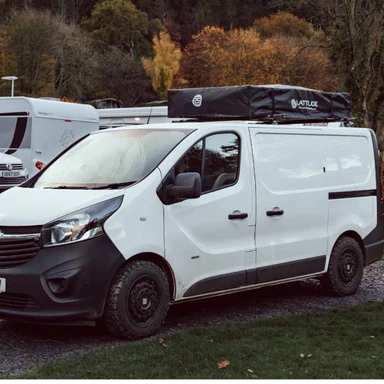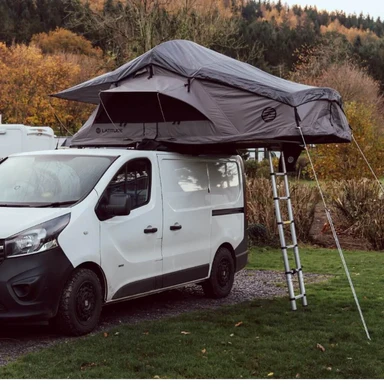

Latitude Pioneer XL Four-Person Soft-shell Rooftop Tent
Bigger than a Super King-sized bed for a Family The internal mattress measures in a...
View full details
Shop Latitude tents for camping, backpacking, or bivy-style travel where convenience matters. Discover our models with smart features like a pop-up setup and vestibule options for extra space. With price points under £3,000, and style choices ranging from soft shell rooftop tents to hard shell rooftop tents to setups with ground floor extensions, Latitude roof tents give you the freedom to camp your way, no matter where you roll.

With a Roof Tent by Latitude Tents there's no having to spend all that time pitching up a tent and nail in stakes which come undone.
Latitude Tents offer great mattress comfort and the fact that you're going to be on flat surface by being your roof makes a world of difference. A Latitude roof tent ensures you sleep comfortably no matter where you camp.
The average cost of a hotel stay in the UK is £79 according to hotels-and-discounts.com. So just 7 nights at a hotel somewhere and you've paid out £553.
No matter the season, your Latitude roof tent provides dependable shelter for unpredictable weather. Roof Tent by Latitude Tents come with great rain & water resistance with a minimum Hydrostatic Rating of 3,000mm so you don't need to worry about leaky tents!
Roof Tent by Latitude Tents are made out of great quality materials with the main body made from 320g rip-stop polyester-cotton, with a waterproof & UV resistant coating. All edges are double-stitched and have a silicone sealant backing for added protection through the harsh weather.
With your TentBox you don't have to waste time having to drive to your planned destinations and get there faster before all the crowds.
Shop similar collections: Three Person Roof Tents | 4 Person Roof Tent | Soft Shell Rooftop Tents For Sale | Roof Tents for Land Rovers | RoofbunkCamping with a Rooftop Tent does require a few things to be set up:
1. You need a set roof bars or roof racks for your 4x4 or car that fit your vehicle
2. These roof bars / racks need a large enough weight limit to take the weight of your chosen rooftop tent
3. Check the dynamic weight limit of your vehicle is greater than the weight of the rooftop tent plus your roof bars.
Then you're all set to go on your adventure
In general, rooftop tents are warmer than traditional tents.
There are a few reasons why they are warmer than traditional tents but we do advise additional cold protection like inner tent insulation for the cold winter months. For year-round camping adventures, a Latitude roof tent gives you the benefit of insulation and weather resistance straight out of the box.
1. Elevation - Getting away from the cold ground will increase the warmth in the tent.
2. Thicker materials - especially hard-shell rooftop tents are made of more durable and thicker materials which are better at retaining heat.
3. Some rooftop tents are designed for better insulation keeping you cooler in the summer and warmer in the winter days with your body heat.
Consider storing your rooftop tent away in your garage or storage space when you will not use it for long periods.
You can store your rooftop tent on top of your vehicle all year round.
We think you should consider a few things if you want to this:
1. Protect it from the rain by using a extra water resistant PVC cover
2. Factor in the extra fuel usage by carrying the rooftop tent on your vehicle all year round
3. Risk of theft. Add extra security bolts or get your rooftop tent insured for peace of mind
The main weight limit we need to consider is the dynamic weight limit of your vehicle.
You’ll want to take a look at your car’s manual for the weight limit when choosing tents for the top of your car.
Dynamic weight
Dynamic weight is simply the amount of weight you can have on your car while it’s in motion. Basically how the forces affect it from all directions while driving.
Static Weight
Static weight is just the amount of weight your car can carry while standing still; this includes your gear and passengers.
As long as the roof bars plus the rooftop tent in total are less than the dynamic weight limit of your vehicle then you're set!
Yes a rooftop tent will decrease your mileage due to the added weight and drag from the wind.
By how much it is difficult to estimate and depends on two main factors:
1. The weight of the rooftop tent
2. How bulky the rooftop tent is when closed causing wind resistance
To reduce the impact on mileage choose a rooftop tent that is lighter than 65kg and has a slimeline frame when closed.